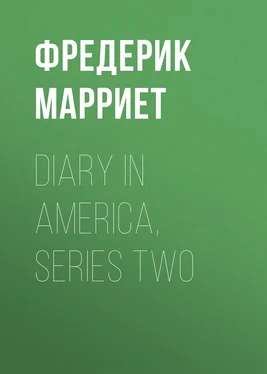Фредерик Марриет - Diary in America, Series Two
Здесь есть возможность читать онлайн «Фредерик Марриет - Diary in America, Series Two» — ознакомительный отрывок электронной книги совершенно бесплатно, а после прочтения отрывка купить полную версию. В некоторых случаях можно слушать аудио, скачать через торрент в формате fb2 и присутствует краткое содержание. Жанр: Путешествия и география, История, literature_19, foreign_edu, foreign_antique, foreign_prose, на английском языке. Описание произведения, (предисловие) а так же отзывы посетителей доступны на портале библиотеки ЛибКат.
- Название:Diary in America, Series Two
- Автор:
- Жанр:
- Год:неизвестен
- ISBN:нет данных
- Рейтинг книги:3 / 5. Голосов: 1
-
Избранное:Добавить в избранное
- Отзывы:
-
Ваша оценка:
- 60
- 1
- 2
- 3
- 4
- 5
Diary in America, Series Two: краткое содержание, описание и аннотация
Предлагаем к чтению аннотацию, описание, краткое содержание или предисловие (зависит от того, что написал сам автор книги «Diary in America, Series Two»). Если вы не нашли необходимую информацию о книге — напишите в комментариях, мы постараемся отыскать её.
Diary in America, Series Two — читать онлайн ознакомительный отрывок
Ниже представлен текст книги, разбитый по страницам. Система сохранения места последней прочитанной страницы, позволяет с удобством читать онлайн бесплатно книгу «Diary in America, Series Two», без необходимости каждый раз заново искать на чём Вы остановились. Поставьте закладку, и сможете в любой момент перейти на страницу, на которой закончили чтение.
Интервал:
Закладка:
I have had many conversations with English emigrants in the United States, and I never yet found one at all respectable, who did not confess to me that he repented of emigration. One great cause of this is honourable to them; they feel that in common plain-dealing they are no match for the keen-witted, and I must add unprincipled, portion of the population with which they are thrown in contact. They must either sacrifice their principle or not succeed.
Many have used the same expression to me. “It is no use, sir, you must either turn regular Yankee and do as they do, or you have no chance of getting on in this country.”
These people are much to be pitied; I used to listen to them with feelings of deep compassion. Having torn themselves away from old associations, and broken the links which should have bound them to their native soil, with the expectation of finding liberty, equality, and competence in a new country, they have discovered when too late that they have not a fraction of the liberty which is enjoyed in the country which they have left; that they have severed themselves from their friends to live amongst those with whom they do not like to associate; that they must now labour with their own hands, instead of employing others; and that the competence they expected, if it is to be obtained, must be so by a sacrifice of those principles of honesty and fair-dealing imbibed in their youth, adhered to in their manhood, but which now that they have transplanted themselves, are gradually, although unwillingly, yielded up to the circumstances of their position.
I was once conversing with an Irishman; he was not very well pleased with his change; I laughed at him, and said, “But here you are free, Paddy.”—“Free?” replied he, “and pray who the devil was to buy or sell me when I was in Ireland? Free! och! that’s all talk; you’re free to work as hard as a horse, and get but little for so doing.”
The German emigrants are by far the most contented and well-behaved. They trouble themselves less about politics, associate with one another as much as possible, and when they take a farm, always, if they possibly can, get it in the neighbourhood of their own countrymen.
The emigrants most troublesome, but, at the same time, the most valuable to the United States, are the Irish. Without this class of people the Americans would not have been able to complete the canals and rail-roads, and many other important works. They are, in fact, the principal labourers of the country, for the poor Germans who come out prefer being employed in any other way than in agriculture, until they amass sufficient to obtain farms of their own. As for the Irish, there are not many of them who possess land in the United States, the major portion of them remain labourers, and die very little better off than when they went out. Some of them set up groceries (these are the most calculating and intelligent,)—and by allowing their countrymen to run in debt for liquor, etcetera, they obtain control over them, and make contracts with the government agents, or other speculators (very advantageous to themselves,) to supply so many men for public works; by these means a few acquire a great deal of money, while the many remain in comparative indigence.
We have been accustomed to ascribe the turbulence of the Irish lower classes to ill-treatment and a sense of their wrongs, but this disposition appears to follow them every where. It would be supposed that, having emigrated to America and obtained the rights of citizens, they would have amalgamated and fraternised to a certain degree with the people: but such is not the case; they hold themselves completely apart and distinct, living with their families in the same quarter of the city, and adhering to their own manners and customs. They are just as little pleased with the institutions of the United States as they are with the government at home; the fact is, that they would prefer no government at all, if (as Paddy himself would say) they knew where to find it. They are the leaders in all the political rows and commotions, and very powerful as a party in all elections, not only on account of their numbers (if I recollect rightly, they muster 40,000 at New York,) but by their violence preventing other people from coming to the poll; and, farther, by multiplying themselves, so as greatly to increase their force, by voting several times over, which they do by going from one ward to another. I was told by one of them that, on the last election he had voted seven times. 7 7 I don’t know why, but there is no scrutiny of the votes in American elections, or if there be, I never heard of one being made.
An American once said to me that the lower Irish ruled the United States, and he attempted to prove his assertion as follows:
The New York election is carried by the Irish; now the New York election has great influence upon the other elections, and often carries the State. The State of New York has great influence upon the elections of other States, and therefore the Irish of New York govern the country.—QED.
The Irish, in one point, appear to improve in the United States—they become much more provident, and many of them hoard their money. They put it into the Savings Banks, and when they have put in the sum allowed by law to one person, they deposite in other names.
A captain of one of the steam-boats told me an anecdote or two relative to the Irish emigrants, by which it would appear that they are more saving of their money than is quite consistent with honesty.
He constantly received them on board, and said that sometimes, if they were very few, they would declare at the end of the trip that they had no money, although when detained they never failed to produce it; if they were very numerous they would attempt to fight their way without paying. In one instance, an Irishman declared that he had no money, when the captain, to punish him, seized his old jacket, and insisted upon retaining it for payment. The Irishman suffered it to be taken off, expecting, it is to be presumed, that it would be returned to him as valueless, when the captain jerked it overboard. “Oh! murder!—captain, drop the boat,” cried Paddy; “pick my jacket up, or I’m a ruined man. All my money’s in it.” The jacket was fortunately picked up before it sank, and, on ripping it up, it was found to contain, sewed up in it, upwards of fifty sovereigns and gold eagles. The same captain narrated to me the particulars of one instance in which about one hundred Irish were on board, who when asked for payment, commenced an attack upon the captain and crew with their bludgeons; but, having before experienced such attempts, he was prepared for them, and receiving assistance from the shore, the Irishmen were worsted, and then every man paid his fare. The truth is that they are very turbulent, and the lower orders of the Americans are very much enraged against them. On the 4th of July there were several bodies of Americans, who were out on the look-out for the Irish, after dark, and many of the latter were severely beaten, if not murdered; the Irish, however, have to thank themselves for it.
The spirit of the institutions of the States is so opposed to servitude, that it is chiefly from the emigrants that the Americans obtain their supply of domestics; the men servants in the private houses may be said to be, with few exceptions, either emigrants or free people of colour. Amongst other points upon which the Americans are to be pitied, and for which the most perfect of theoretical governments could never compensate, is the misery and annoyance to which they are exposed from their domestics. They are absolutely slaves to them, especially in the western free States; there are no regulations to control them. At any fancied affront they leave the house without a moment’s warning, putting on their hats or bonnets, and walking out of the street-door, leaving their masters and mistresses to get on how they can. I remember when I was staying with a gentleman in the west, that, on the first day of my arrival, he apologised to me for not having a man servant, the fellow having then been drunk for a week; a woman had been hired to help for a portion of the day, but most of the labour fell upon his wife, whom I found one morning cleaning my room. The fellow remained ten days drunk, and then (all his money being spent) sent to his master to say that he would come back on condition that he would give him a little more liquor. To this proposition the gentleman was compelled to assent, and the man returned as if he had conferred a favour. The next day, at dinner, there being no porter up, the lady said to her husband, “Don’t send for it, but go yourself , my dear; he is so very cross again that I fear he will leave the house.” A lady of my acquaintance in New York told her coachman that she should give him warning; the reply from the box was—“I reckon I have been too long in the woods to be scared with an owl.” Had she noticed this insolence, he would probably have got down from the box, and have left her to drive her own cattle. The coloured servants are, generally speaking, the most civil; after them the Germans; the Irish and English are very bad. At the hotels, etcetera, you very often find Americans in subordinate situations, and it is remarkable that when they are so, they are much more civil than the imported servants. Few of the American servants, even in the large cities, understand their business, but it must be remembered that few of them have ever learnt it, and, moreover, they are expected to do three times as much as a servant would do in an English house. The American houses are much too large for the number of servants employed, which is another cause for service being so much disliked.
Читать дальшеИнтервал:
Закладка:
Похожие книги на «Diary in America, Series Two»
Представляем Вашему вниманию похожие книги на «Diary in America, Series Two» списком для выбора. Мы отобрали схожую по названию и смыслу литературу в надежде предоставить читателям больше вариантов отыскать новые, интересные, ещё непрочитанные произведения.
Обсуждение, отзывы о книге «Diary in America, Series Two» и просто собственные мнения читателей. Оставьте ваши комментарии, напишите, что Вы думаете о произведении, его смысле или главных героях. Укажите что конкретно понравилось, а что нет, и почему Вы так считаете.












